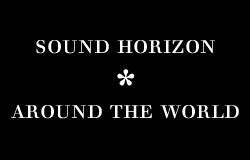FOOL’S MATE, a Japanese music magazine mainly focused on Rock and Visual Kei, included an interview to Revo in its July 2011 issue, as part of its special ‘new talents section’ Neotypo. This long interview focuses on the meaning of Story Music, the roots of Revo’s inspiration, the usage of worldviews and the 2011 live tour, the 1st Territorial Revival.
Thanks to Defade for the translation!
An Uncategorizable innovative way of entertainment
The roots of Sound Horizon. A charm that dwells in songs, sound, poetry, narration and drama.
On December last year, Märchen – the new album by Sound Horizon, released after two years – managed to get to the 2nd place at the Oricon Weekly Charts, and the Story Concert tour held during the end of last year and the beginning of this year gathered up to 35,000 people.
What this band really is, is a group of artists that perform original stories created by Sound Producer Revo, Story Music expressed by means of every possible form of sound and performance.
Their CD jackets and lyric booklets are major points of interest in Sound Horizon, but it is inside concert halls where their large-scale scenic display unfolds, that their magic appears in its utmost expression.
When it comes to live stage, Sound Horizon is divided in two by a line: In one side we have “Concerts”, in which they perform a thorough interpretation of one album, and “lives”, in which songs from past releases are played in a wide range of different styles.
In order to draw nearer to the roots of such a band like Sound Horizon, we dared to make a long interview to its leader Revo! Along with some photographs of their past live performances, we made an approach to what kind of things become motifs of Revo’s story music, and found out more about the “1st Invasion of Territorial Reconstruction”, the live tour starting next July, aimed to the support of the area struck by the Tohoku Earthquake.
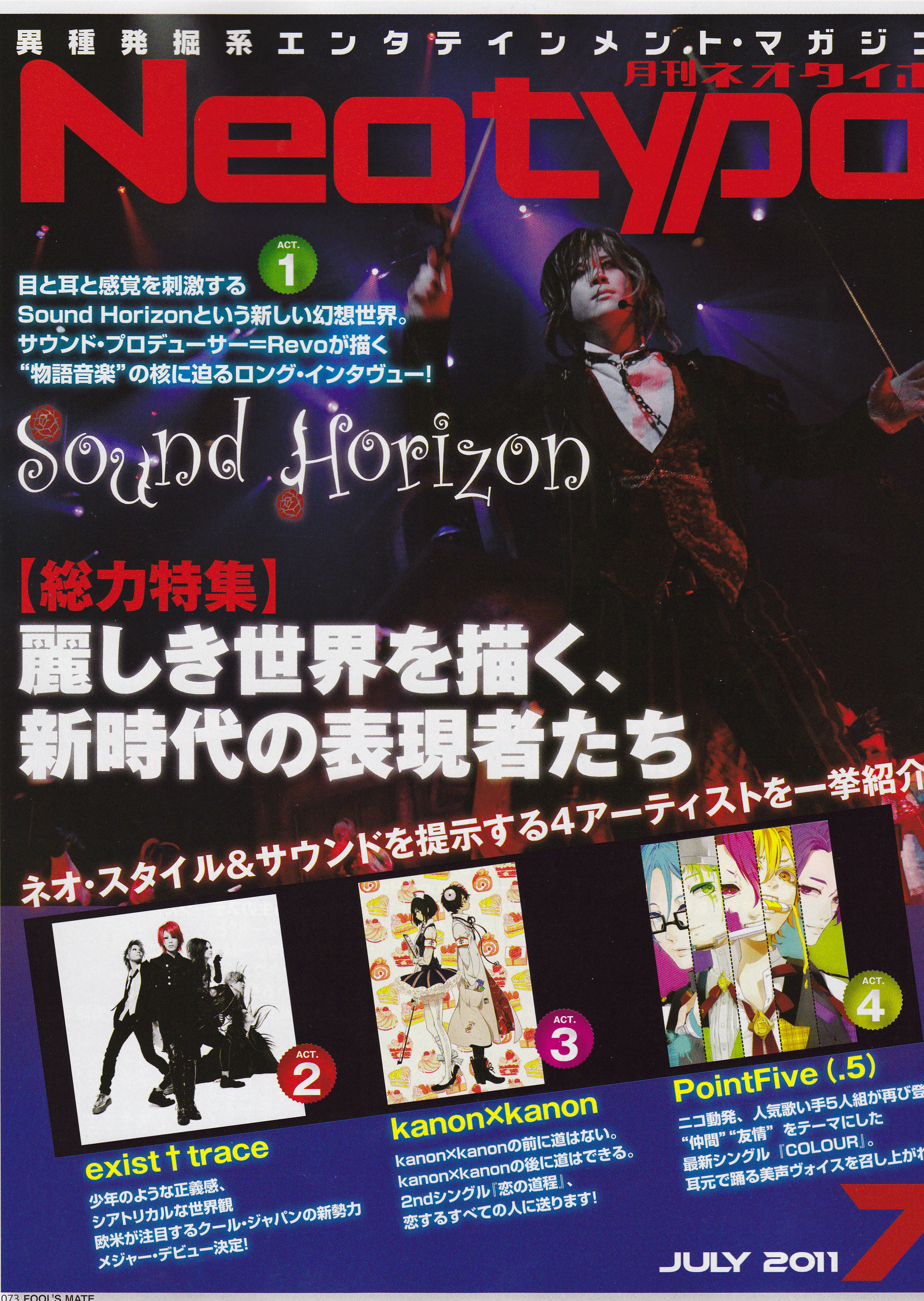 |
 |
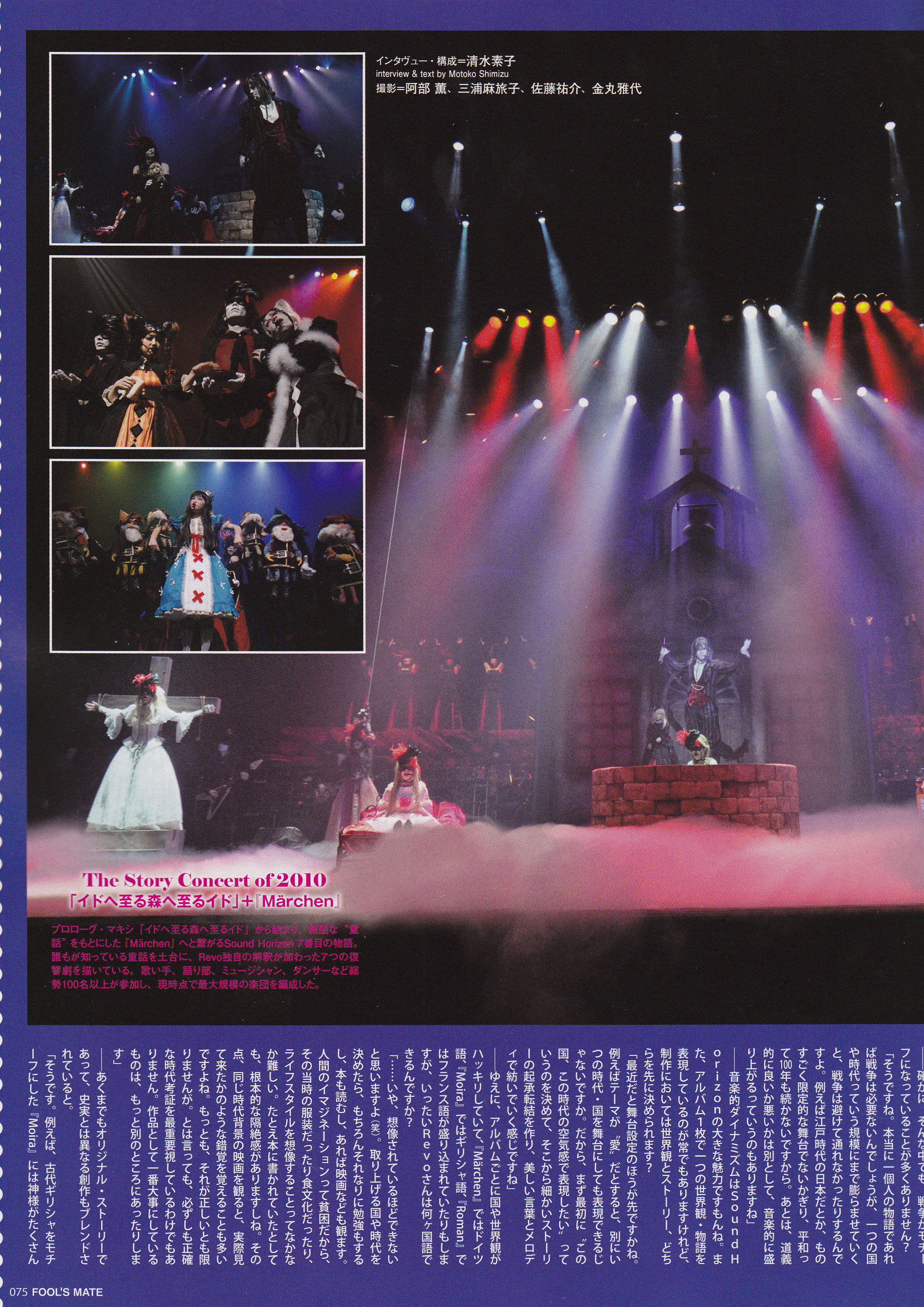 |
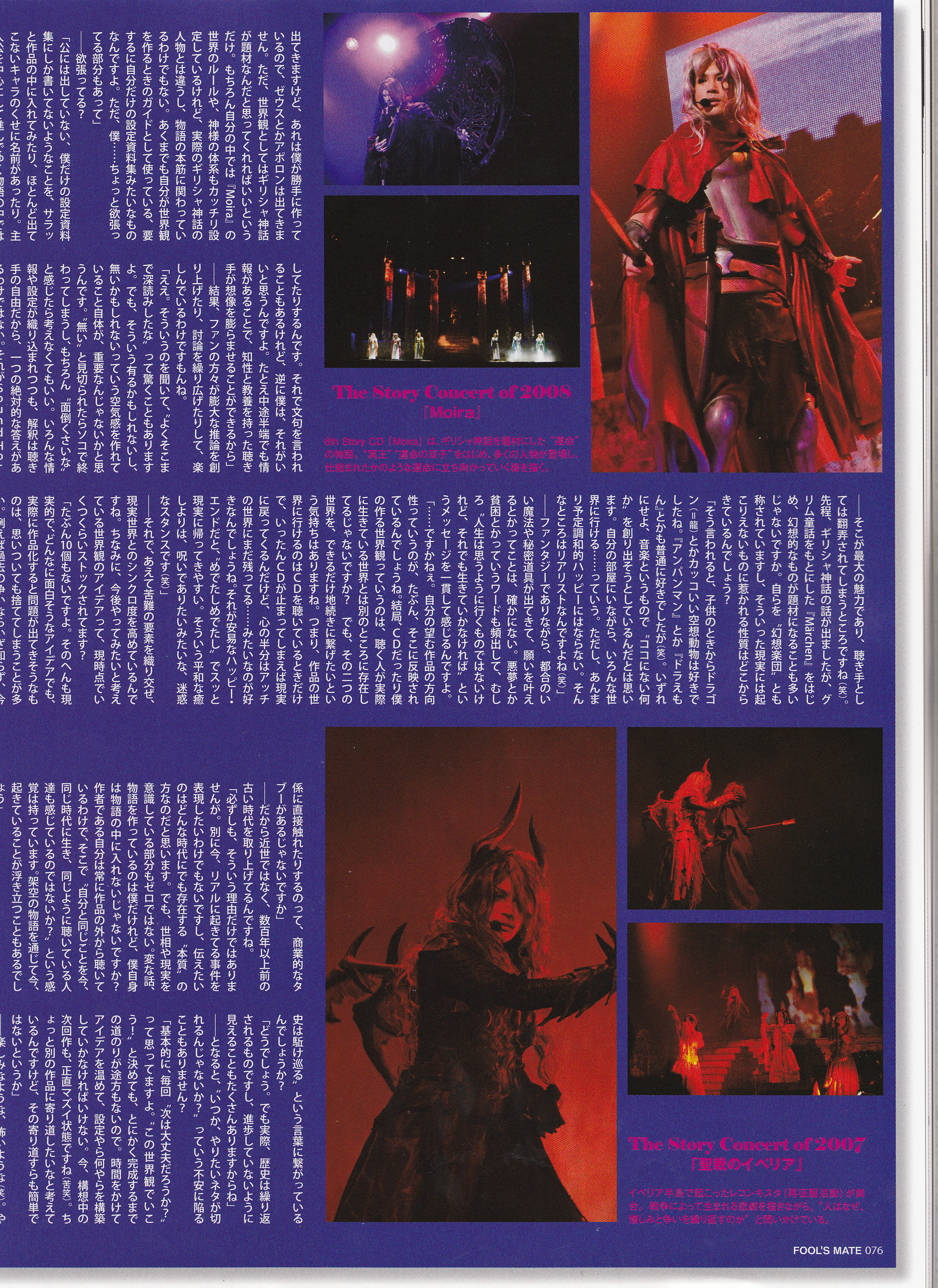 |
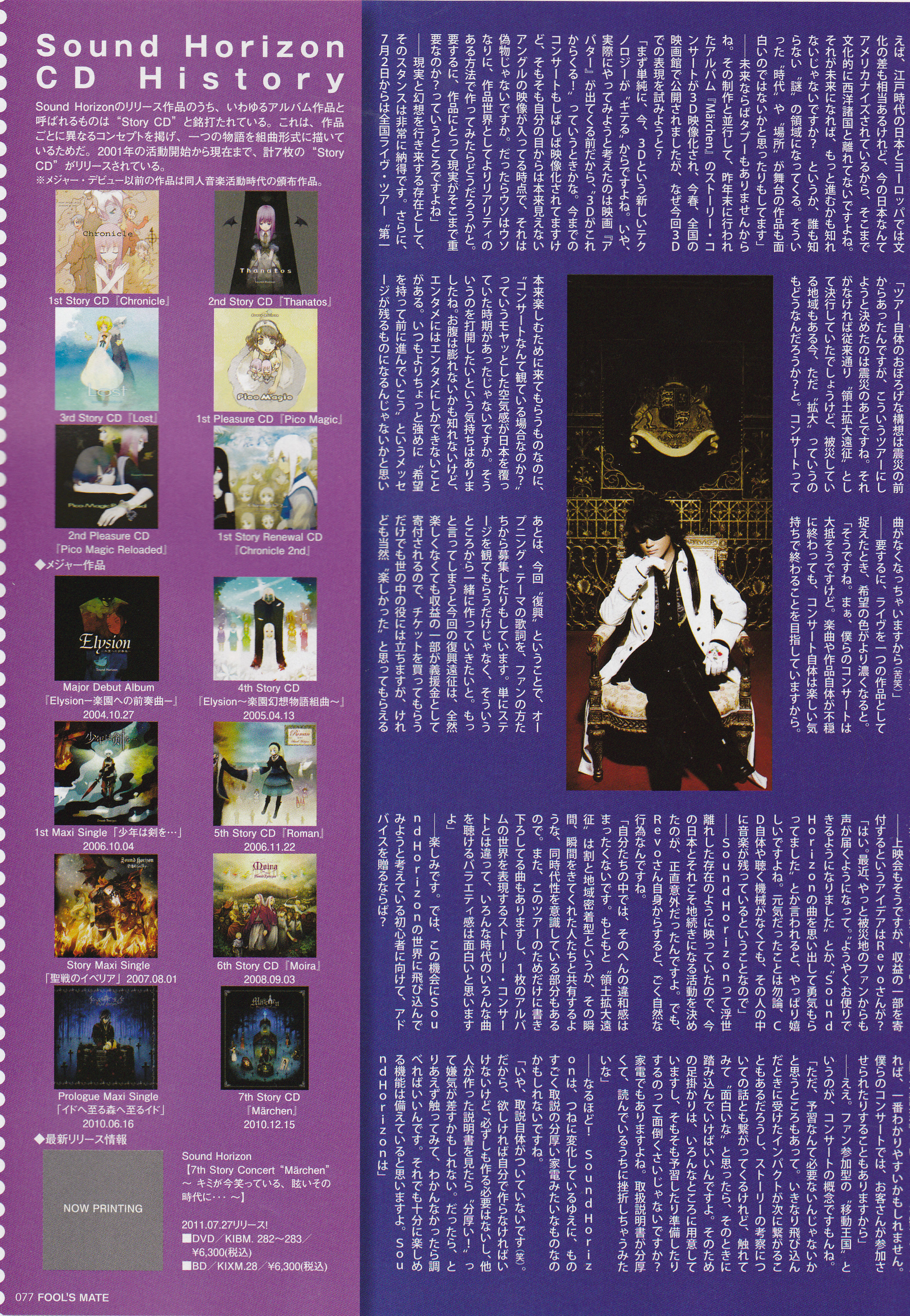 |
Speaking of Sound Horizon, a lot of its stories have actual culture or history as their motifs. Last year’s release of “Marchen” mixed Grimm fairytales with German history, and before that, the 6th album “Moira” was set in ancient Greece while the single “Seisen no Iberia” related to reconquista. For what reasons do you choose history as your topics?
R. ―Firstly, there’s the simple reason of them being easy to imagine. Plus, culture isn’t something made within a day, so isn’t it pretty much impossible to create a completely new culture? I just end up basing them off “Islamic tradition” or “Greek tradition”. In addition, right now I don’t exactly feel like emphasizing the originality of my worldviews that much. So I just take a “this worldview is pretty nice” kind of approach and then add some of my original elements into it…that’s what I’ve been doing a lot recently. As a result, I represent every single world I create with the word “horizon” in the albums.
In other words, Sound Horizon, as the band name, represents the concept of weaving story worlds with sounds.
R. ―That’s right. If the window/song from which you look changes, the era and places you see will change accordingly as well – but no matter which world it is, there will always be a horizon. That’s the image I have in mind.
However, every single one of them has elements of Western worldviews and cultures – I don’t quite see any other type of stage.
R. ―That’s because I wanted to avoid making the same type of songs over and over again. I’ve often been asked “Won’t you set the stage on Japan?”, but for example, even if it’s easy to depict temples using Gagaku, isn’t it rather difficult to depict a more complicated story with that? As another example, it would be rather hard to express a tragic history with the casual, relaxed type of sounds you associate with “Hawaiian”. My main point is, the more specific I delve into a certain type of music, the harder it is to express the range of emotions from joy to sadness, anger to happiness. Stories aren’t the only things I want to express, I also want to present you with music that has a certain degree of variety, and that would be most easily accomplished – not with folk music, but with Western styled music that has become the foundation of the more popular music we listen to on a daily basis. In the end, what really matters is whether or not it matches with the story.
Indeed. There were quite a lot of war motifs being used in them.
R. ―That’s right. If it’s just the story of an individual, then war isn’t necessary, but if I expand the scope to an entire country or era, then war is inevitable. For example, unless you limit the stage to a very specific point in time – such as the Edo period in Japan -, peace won’t last for 100 years. What else…putting aside issues of whether it’s morally alright or not to do so, war can be quite climatic in musical terms.
Dynamic music is one of the bigger charm points of Sound Horizon, after all. Also, it has become somewhat of a norm to represent one worldview and one story in each album, but during production, what do you lay down in stone first? The worldview, or the story?
R. ―Recently, I’ve prioritized the stage setting. For example, if I choose my theme as ‘love’ – isn’t that something I can represent regardless of what era or country I pick as the stage? So at first, I decide that “I want to express the atmosphere of this country, this era”, then I start making the flow of the story in detail, at last weaving them in beautiful words and melodies.
That’s why the countries and worldviews in each album are distinct from each other, with “Marchen” filled with German, “Moira” with Greek and “Roman” in French. Just how many languages do you know, Revo?
R. ―…actually, not as much as you think. (laughs) Obviously, once I’ve decided on the country and era, I’d do some semblance of research, read books on it, and if possible, watch related movies. Human imagination isn’t very rich, so it’s rather difficult to imagine the lifestyle of an era – be it clothing or food culture. Even if they’re described in books, there is a fundamental sense of separation. If you watch a movie set in that era, you often mistakenly think that you’ve actually experienced the era for yourself. Of course, what’s depicted might not actually be accurate. Still, completely accurate portrayal of an era isn’t on the top of my priorities. The most important aspect of a work lies elsewhere.
In the end, you just want to present an original story, a creation different from historical facts.
R. ―That’s right. For example, quite a few gods made appearances in “Moira” with is Greek motifs, but those were my creation, and you won’t see Zeus or Apollo. It’s fine if you just think of it as a worldview with Greek myth as its theme. Of course, I have thought of detailed settings regarding the world’s rules or the system of gods, but they’re different from the actual Greek myths and don’t quite relate to the main story either. In the end, I’m only using them as a guide when making a worldview, to put it simply, it’s something like a setting guidebook available only to myself. But…I’m rather greedy at times.
Greedy?
R. ―I tried sneakily adding things that are only written in my personal setting guidebook into my works, putting in names of characters that haven’t even made much of an appearance. I tend to give peeks of information about secondary characters within the story’s progression centered on the main character. I hear lots of complaints about that, but I actually think it’s pretty nice myself. Even with partial information, knowledgeable and sophisticated listeners will be able to expand their imagination.
As a result, fans make huge amounts of theories and engage in intense discussions, but they’re all enjoying it.
R. ―That’s right. There have been a few occasions when I’ve been surprised by some of them, “wow, you read that far into it”. But I think it’s rather important to create the kind of atmosphere where ‘that sort of thing might be possible, or it might not be’. It’ll the end if you slam your fist down and say “no, there’s nothing there”, and of course, if you feel like it’s “so troublesome”, you have the choice to stop thinking. Even if I’ve interwoven quite a lot of information and settings, interpretations are up to the listeners themselves. It’s not like there’s one absolute answer. That is Sound Horizon’s stance.
That’s its biggest charm point, as well as the cause of much bafflement among listeners. (laughs) We’ve talked about Greek myths just now, but counting “Marchen” with Grimm fairytales as the motif, most of the topics are fantasy. And since the band proclaims itself as “Fantasy Band”, where does the attraction to impossibilities in real life come from?
R. ―Now that you mention it, I’ve thought of dragons as cool, imaginary animals and liked them ever since my childhood. I’ve also taken quite a liking to shows like “Anpanman” and “Doraemon” as well.(laughs) Still, I want to create “something not here” with music. To be able to visit all kinds of worlds even within your own room…something like that. However, there won’t be cliche happy endings. I guess you can see a bit of a realist in me from that. (laughs)
Despite fantasy, there is a conspicuous lack of convenient magic or secret devices that make all your dreams come true. Words like nightmare or poverty often pop up, and I feel the underlying message is more like “Life isn’t something that goes our way, but we have to live on regardless”.
R. ―…perhaps. I guess you could call it a reflection of the kind of direction I want my works to take. In the end, the worldview I’ve created in CDs lies in a different place than the world of listeners, right? But I feel like I want to connect those two worlds as much as possible. In other words, the only time when you can go to the other world is while you’re listening to the CD, and once you’ve stopped that, you’ll come back to reality, but half of your heart remained on the other side…I think I rather like that kind of feeling. If it’s some cheap happy ending, then it’s very easy to slip back into reality with a simple “all’s well ends well”. Instead of a peaceful healing effect, I’m going for more of a curse. It’s a rather troubling stance of mine. (laugh)
And that’s why you interweave elements of hardship, increasing the correlation with the real world. By the way, how many worldview ideas – ones that you’re thinking of trying out in the future – do you have in stock right now?
R. ―Less than 10, I’m afraid. There’re some very real issues concerning those ideas – no matter how interesting they might seem, I often end up scrapping ideas that might cause problems if they were actually made into a piece of work. For example, though conflicts of the past might be able to slip under the radar, as soon as I directly touch antagonisms such as people killing people nowadays, some kind of business taboo comes up, doesn’t it?
So that’s why you pick ancient eras dating more than hundreds of years back instead of recent times.
R. ―Of course, that’s not the only reason. It’s not like I really want to express current events in our world; what I seek to depict is more of the “essence” that’s prevalent in any era. But I’m not completely ignorant of the current state of the world or reality either. It’s a strange thing, but even though I’m the one creating these stories, I can’t exactly put myself in them, can I? As the author, I always listen to my works from the sidewalk, and I start to think “maybe there are people who, living through the same era and listening to the same things as myself, feel the same way as well?”. There might also be times when current events come to life through a fantasy story.
Could that have something to do with the words “History repeats itself” appearing frequently in your work?
R. ―I wonder. But actually, history is something that repeats itself, and there have been quite a lot of areas in which there’s no progress to be seen.
Speaking of, have you ever been anxious about running out of ideas one day?
R. ―Basically, I think to myself, “Am I still good to go?” every single time. Even if I’ve decided to “go with this worldview!”, I’m at a loss of how to reach the goal. I have to spend lots of time mulling over my ideas, constructing settings and whatnot. To be honest, the next album I’m thinking of is in a rather bad state right now.(smiles wryly) I’ve thought of making a slight detour to some other work, but even that detour isn’t something so easily done.
I’m kind of looking forward to it and kind of scared at the same time. (laughs) And let me guess, it will be set in a western country, won’t it?
R. ―Who knows! However, someday I’d also like to try and create a work in which those places don’t become such an essential part.
“For example, though there’s quite the cultural difference between Japan and Europe during the Edo period, but Japan right now is being Americanized, so it’s not that far away from Western countries in that sense. Maybe that’ll progress even further in the future? Those kind of ‘what if’s become an area of “mystery”. And at times I thought that it might be interesting to set the stage upon that kind of “era” and “place”.
And if you’re working with the future, then there’s no taboo to speak of. Undergoing development at the same time is the 3D movie version of “Marchen”‘s story concert that took place last year, and showings were held all over the nation during spring. Why did you go for 3D this time?
R. ―There’s the simple reason of this 3D technology being the ‘new thing’. Actually, I’ve had this thought even before “Avatar” came out, so it’s more during a time when people thought that “the time of 3D is coming up!”. Concerts till now have all been put on film, but the point at which you see it from normally impossible angles is the point at which it becomes fake, isn’t it? So I might as well go all out on this lie and create this fictionalized world in a ‘realistic’ manner. Main point being, is reality itself honestly all that important to my work?
I can completely understand your stance, since you are someone who often goes between reality and fantasy. Moreover, a nationwide live tour titled “The 1st Territorial Revival” will be held from 7/2 onward, and as for what I can deduce from this title, this tour has been planned as a response to the Tohoku Earthquake Disaster, right?
R. ―I’ve had a hazy concept of the tour even before the earthquake disaster, but the decision to make it into this particular kind of tour happened after the earthquake. If that didn’t happen, I probably would’ve made it into “Territorial Expansion” just as I’ve always done, but since there are areas affected by the earthquake, you just start to think, is “expansion” really alright? Even though concerts are meant to be a form of entertainment, but there’s been a time when a rather fuzzy atmosphere of “Can we really afford to attend concerts right now?” permeated throughout all of Japan. I’ve wanted to break through that sort of mood. It might not be completely filling, but I think that there’re things that only entertainment can do. I think it’ll leave a stronger message of “move forward with hope” than usual. However, I can’t just exclude every single song in which someone dies. Because if I stuck to this rule, I’d run out of songs. (smiles wryly)
To summarize, if you see the lives as one piece of work, there’ll be more emphasis on the aspect of hope?
R. ―That’s right. Well, you can say the same for almost all of our concerts though. Even if the music and works themselves end on an unhappy note, I’ve aimed to end the concerts themselves in a happy air. Also, we’re going for ‘revival’ this time, so I’ve tried to assemble the lyrics of the opening theme from the fans themselves. And even if you don’t enjoy this revival tour at all, part of the revenue will be donated towards charity efforts, so you’ll be helping the world by just buying tickets. Of course, I’d prefer it if you ‘had fun’ as well.
The same can be said of some of the movie showings as well. Does the idea to donate part of the revenue come from you, Revo?
R. ―Yes. Recently, the voices of fans in the affected areas finally reached me. I’m truly happy to hear things like “I can finally write letters” or “remembering the music of Sound Horizon gave me courage”. Of course, I’m happy for their health, but also for the fact that the music remained within them, even without the CDs or devices to play them.
Sound Horizon always seemed kind of separate from the world, so I was honestly a bit surprised at this course of action regarding Japan that seems rather ‘down to earth’. But coming from Revo himself, it seemed rather natural.
R. ―Personally, I don’t feel any dissonance concerning that aspect myself. In the first place, “Territorial Expansions” are quite area-specific, or well, there’s that part of wanting to share that moment, that precise moment with the people who came. Also, I’ve written some songs specifically for this tour, but they’re different from story concerts that express the world of separate albums, since I think it’s quite fun to be able to hear a variety of songs from different eras.
I’m looking forward to it. So, if you were to give some advice to newcomers to the Sound Horizon world, what would you say?
R. ―Let’s see. For those who are looking for some kind of “Sound Horizon 101” in order to enter its world, I’d say that watching the “Triumph of Territorial Expansion III – Celebration of Revo’s Inception” DVD would be the least puzzling point to start from. Since our concerts require some audience participation as well.
That’s right, the concept for concerts is a “traveling kingdom” that fans participate in, after all.
R. ―However, I think there’s no need to practice or anything. The sudden impact you experience will naturally connect to the next one, and it’ll tie in with whatever research you’ve done for stories, but it’s completely alright to just step in once you’ve gotten a feel for it and think to yourself, “that’s kind of interesting”. Quite a few stepping stones have been prepared already, and isn’t it rather bothersome to rehearse or prepare? Just look at the electronics in your home. The instruction booklets are way too thick, and you just end up feeling frustrated as you read them.
I see! Since Sound Horizon is in a constant state of flux, maybe it’s somewhat like electronics with ultra thick instruction booklets.
R. ―But we don’t actually have an instruction booklet. (laughs) So you’ll have to make your own if you want to, but it’s not really a necessity, and you might think “Too thick!” if you read the instruction booklets that other people have made. So for now, just touch on it lightly, and if you don’t understand something, just look it up. I think Sound Horizon has enough functions for you to enjoy it that way.



